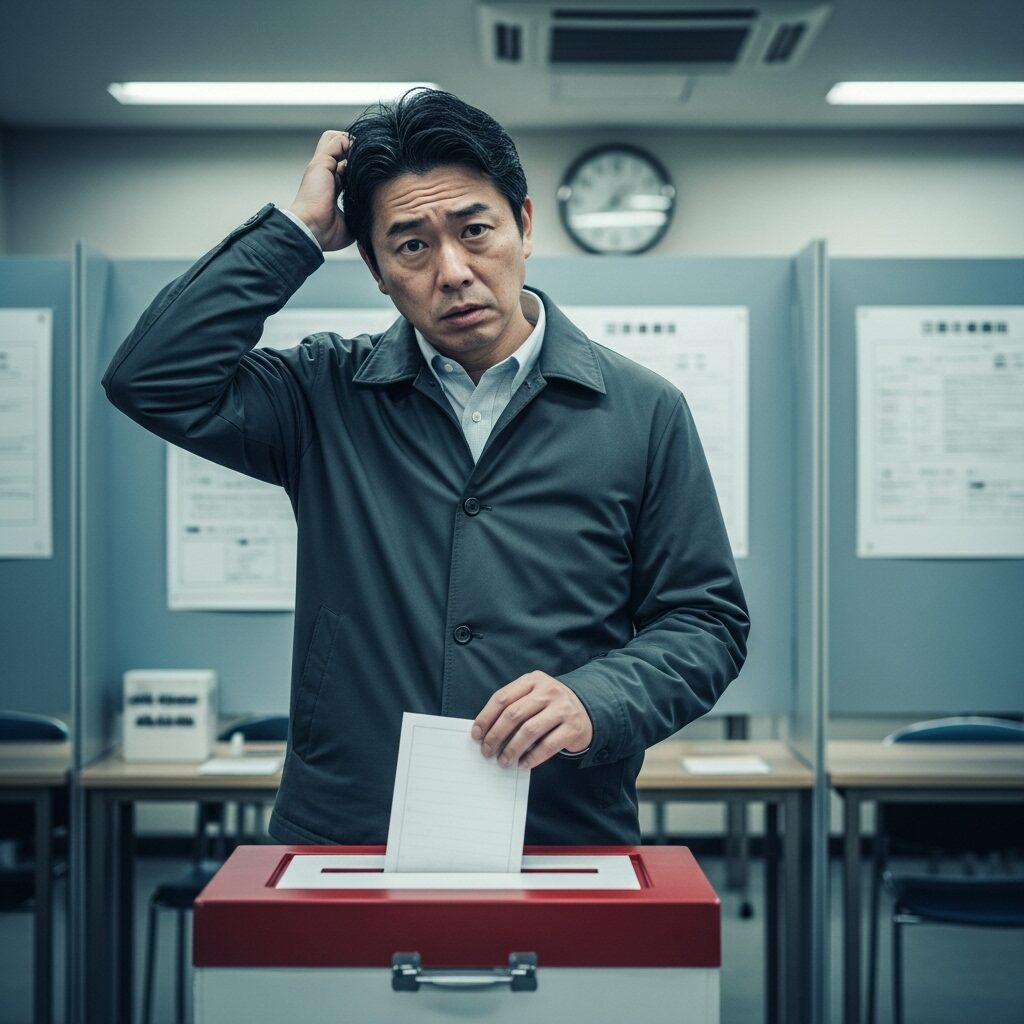Introduction | Why This Frustrates Me So Much
Japan’s 2025 House of Councillors election.
The official voting instructions for proportional representation say:
“You can write either the official name or the abbreviation.”
At first glance, this seems kind and convenient.
But in reality, this system is anything but voter-friendly.
For example, writing “Democratic Party” on your ballot.
Do you think your vote will go to the party you meant?
The truth is — almost all of those votes end up with the Constitutional Democratic Party (CDP).
Chapter 1 | Write “Democratic Party,” and It Goes to the CDP Anyway
Both parties have officially registered the same abbreviation: “Democratic Party.”
| Party | Abbreviation |
|---|---|
| Constitutional Democratic Party (CDP) | Democratic Party |
| Democratic Party for the People (DPP) | Democratic Party |
So where does your “Democratic Party” vote go?
The Reality of “Vote Splitting”
The election commission treats ambiguous votes this way: they split them proportionally.
Here’s how it worked in the 2021 Lower House Election:
| How it’s written | Split ratio |
|---|---|
| Democratic Party | About 80% → CDP / About 20% → DPP |
In other words, if you write “Democratic Party,” 80% of the time your vote goes to the CDP.
Voters are not properly informed of this reality.
Chapter 2 | Why Does This Unfriendly System Still Exist?
Because It Benefits Politicians, Not Voters.
If this country truly prioritized voters, it would simply:
✅ Ban overlapping abbreviations
✅ Require writing official names
✅ Treat ambiguous ballots as invalid
But that’s not the case. Why?
Because this messy system benefits politicians.
| Who Benefits? | What Happens |
|---|---|
| CDP | Over 80% of “Democratic Party” votes automatically go to them |
| DPP | Doesn’t want to give up the abbreviation; fears losing votes |
| Election Commission | No need to reform, just split the votes |
| Politicians Overall | No one wants a change that puts them at a disadvantage |
In short: the more confused voters are, the better for politicians.
Chapter 3 | If This Were Truly Voter-First, It Wouldn’t Look Like This
“Either the official name or abbreviation is fine.”
If this country really cared about voters,
they’d simply say:
“Please write the official party name.”
But they don’t, because they know confused ballots will flow toward the CDP.
As long as “vote splitting” exists, ignorant votes will be skewed.
This vague, unclear system reveals the true nature of Japanese politics.
Chapter 4 | Small Dishonesty Has Kept Japan in Stagnation for 30 Years
You might think: “This is such a small, trivial issue.”
But this is exactly where Japan’s deeper problems show.
- Prioritizing political convenience over voter clarity
- Leaving inconvenient systems untouched
- Politicians more focused on their win/loss than on the people
Small dishonesties like this have stalled Japan for decades.
Chapter 5 | At Least, Protect Your Own Vote
Politicians won’t change this.
Don’t expect the system to improve on its own.
The only thing voters can do: protect their own ballots.
| If you want to vote for… | Write this: |
|---|---|
| Constitutional Democratic Party | Constitutional Democratic Party / CDP |
| Democratic Party for the People | Democratic Party for the People / DPP |
Just remember: if you write “Democratic Party,” your vote might not go where you think.
Conclusion | This Country Won’t Change by Politicians Alone — It’s Voters Who Decide
Leave things to politicians, and nothing will change — only what benefits them remains.
The only power to change the future lies in each voter’s single ballot.
So let’s think carefully, even about small things like this.
The future won’t change unless we act.
One Last Thing
“It’s fine to write the abbreviation.” — Don’t fall for that line.
At least, protect your own vote.
Related Articles
▶ The day I finally chose to choose – a quiet shift toward the ballot box
▶ Only three pitches left – and I still throw: a little story about life and baseball



コメント